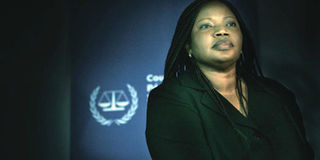ICC prosecutor seeks time to meet witnesses

Photo/FILE
ICC prosecutor Fatou Bensouda argues that in both cases, multiple witnesses reported being offered bribes not to cooperate with the prosecution and/or threats if they cooperate.
What you need to know:
- Normally, the process has permitted a brief courtesy meeting between counsel and witness, but barred factual discussions and placed the task of witness familiarisation on the victim and witnesses unit.
- Ms Bensouda argues that the modification is warranted because Kenyan cases “present acute witness management challenges that require a different approach to witness familiarisation.”
- She adds that the changes will give them opportunity to clarify their evidence, ask meaningful questions about what to expect during testimony, and develop a rapport with questioning lawyer.
ICC prosecutor Fatou Bensouda wants the court to allow more time for her and the accused to talk to witnesses in the two Kenyan cases just before they take the stand at The Hague.
She argues that it is also important to have the opportunity immediately before a witness’ testimony to inquire whether they have been interfered with since their last contact with the calling party.
Ms Bensouda is seeking a modification of the witness familiarisation protocol that has been adopted in other cases. (READ: ICC reveals witness identities to Uhuru)
Normally, the process has permitted a brief courtesy meeting between counsel and witness, but barred factual discussions and placed the task of witness familiarisation on the victim and witnesses unit.
However, it is the prosecutor’s view that all parties and participants be subjected to the same witness preparation rules.
“The proposed modification would allow the party calling a witness to talk to the witness in advance of testimony, with safeguards to avoid coaching or otherwise improperly influencing the witness,” the prosecutor told the trial judges on Monday.
Ms Bensouda argues that the modification is warranted because Kenyan cases “present acute witness management challenges that require a different approach to witness familiarisation.”
She argues that in both cases, multiple witnesses reported being offered bribes not to cooperate with the prosecution and/or threats if they cooperate.
She states that there have also been efforts to expose the identities of protected witnesses.
“Many potential witnesses expressed a fear of being harmed or even killed if they cooperate with the prosecution, and several declined to testify on this basis,” Ms Bensouda says in her submission.
The prosecutor adds that the changes will give them opportunity to clarify their evidence, ask meaningful questions about what to expect during testimony, and develop a rapport with questioning lawyer.
She also wants the preparation conducted by the lawyer who will question the witness in court.




